Text
Revolutionary Girl Utena: Gender in Context
beneath the cut, I discuss the RGU's portrayal of gender in the context of 1990s Japan.
in Ikuhara's interview with Mari Kotani, he stated that in traditional Japanese society, "prince" meant "patriarch." the same is true in Western societies--there was a time when a prince would be an heir to a royal line. by 1997, this meaning had died out of large parts of the world. even the association between princes and traditional masculinity was fading. Saionji, the weakest, most pathetic man in the show, is a parody of historical Japanese masculinity, with his kendo and his blatantly regressive beliefs about women.
in RGU, prince may still mean patriarch, but in a far more subtle fashion. Ikuhara and Kotani discussed the changing expectations for men in the latter half of the 20th century--it became gauche to fight over a woman with one's brawn, so instead, power struggles were played out in the arena of looks and sex appeal. one can see this reflected in the character Akio, whose power as a prince arises from his ability to turn "easy sensual pleasure based on dependency" "into a selling point with which to control people."
Akio has his moments of showboating masculinity, but when preying on Utena, he operates by making himself seem non-threatening and soft.
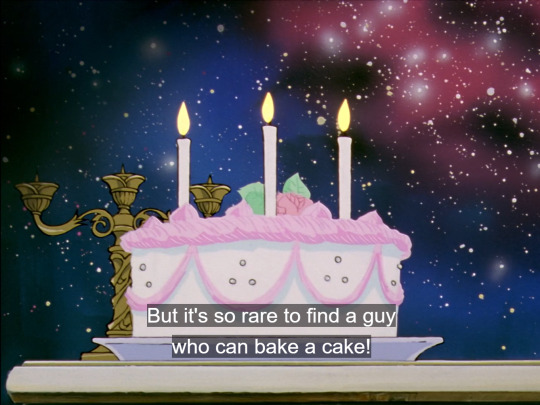
not only that, but he purports to want to allow students to express their individuality and thus approves of Utena's masculine form of dress. this is a front--by the end of the show, he's telling Utena that girls shouldn't wield swords. thus, through Akio's character, the show argues that traditionalist patriarchy in Japan isn't gone, but instead has only been papered over with false progressivism.
with all that said, there seems to be more to the character. he's taken the family name of his fiance, Kanae, and whatever material power he has in the school is dependent upon her family. in Japanese society, this is considered a humiliating position to be in, something that only a shameless man would do. the show never gives the audience any insight into how Akio feels about this--is he unbothered entirely, or are his actions against the Ohtori family an expression of his repressed anger? does he harm the children under his care to compensate for his humiliation?
this aspect of Akio's character may seem irrelevant in light of the larger, immaterial social forces at work in the show. however, I would argue that it was included for a reason. Akio, despite his status as ultimate patriarch of Ohtori, is in fact a highly emasculated character, to the point where lead writer Enokido even said that he is driven by an infantile mother complex.
to explain why Akio was portrayed this way, we have to discuss Japanese history. the nation suffered a major defeat in WWII and was forced to accept whatever terms the United States laid out for it. for an examination of how the Japanese have never truly processed those events and have plunged into modernity with reckless abandon, I recommend Satoshi Kon's Paranoia Agent. to sum it up briefly, in a very short period, the nation regained its economic footing, and by the 1980s had the largest gross national product in the world. this economic boom may have allowed Japan to maintain a sense of sovereignty, dignity, and power, but it was inherently fragile.
the infamous "bubble economy" lasted from 1986 to 1991. during this time, anything seemed possible; financial struggles appeared to be a thing of the past, and capitalist excess reached new heights. the ghosts of this period can be felt across Japanese media; for instance, think of the final shot of Grave of the Fireflies (1998), where the two dead children look down on Kobe, glowing an eerie green to imply its impermanence. the abandoned theme park from Spirited Away (2001) is explicitly referred to as a leftover from the previous century, when many attractions were built and then tossed aside in a few short years.
the bubble popped in 1992, leaving an entire generation feeling cheated. the bright futures they'd been promised, which had actually materialized for their parents and older siblings, had been lost to them overnight. economic crises are often accompanied by gender panics. to quote from Masculinities in Japan, "The recession brought with itself worsening employment conditions, undermining the system of lifelong employment and men’s status of breadwinners in general. The unemployment rate was rising, and although it never reached crisis levels, men could no longer feel safe in their salaryman status. Their situation was further complicated by the rising number of (married) women entering the workforce."
with this in mind, Akio's character can be taken as a representation of masculinity in crisis in 90s Japan. he's forced to rely on women for his position in life and has failed to save his only relative, Anthy. he tries to escape his misery through hedonism, perhaps an allegorical representation of how men tried to maintain their old standard of living after the economic bubble burst.
but of course, Akio is not the main character of RGU--the story is about girls. mangaka Yamada Reiji discussed the series in the context of the 90s, stating the following:
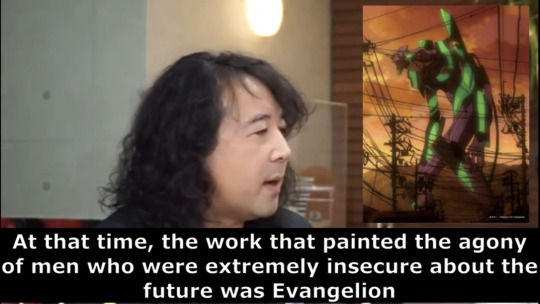
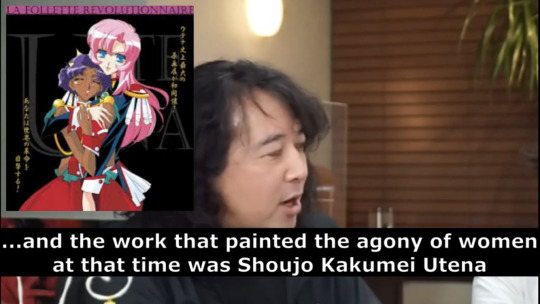
while I opened this essay by discussing the prince, the same points could be made about the princess. despite the increasing irrelevance of royalty, princess is still an important concept. how does it relate to the socioeconomic landscape of the 90s?
in Yamada's view, RGU is full of relics of the 80s; for instance, the figure of the ojou-sama, an entitled young woman who never lifts a finger for herself. during the economic bubble, it was increasingly common for women to be entirely taken care of by the men in their lives. Yamada names Nanami as a clear ojou-sama type character: she weaponizes her femininity, demanding to be rescued, doted on, and served.
however, by 1997, the ojou-sama could no longer expect to get what she wanted. from the 80s to the 90s, the percentage of women in the workforce increased around 15%; it was no longer viable for most women to be "kept" by their families. as the men experienced the humiliation of not being able to provide for their wives and children, women were undergoing a disillusionment of their own.
Yamada blames Disney for creating the ideological structure which led women astray. obviously, the company is known for its films about princes rescuing princesses. in Yamada's recounting, during the 80s, the company was infiltrating Japan through its theme parks as well; across the country, Disneylands were opening up, and people were buying into the escapism the corporation offered. Japan, as America, became a country of eternal children. its people were waiting for a prince to appear and save them.
but fairy tales can't stave off reality forever. Yamada claims that RGU embodies the rage of young women who woke up one day and realized that they had been raised on a lie. this anger pervades the work from beginning to end.
though RGU was created in a particular social context, its lessons can be extrapolated to any time and place. as the first ending tells us:
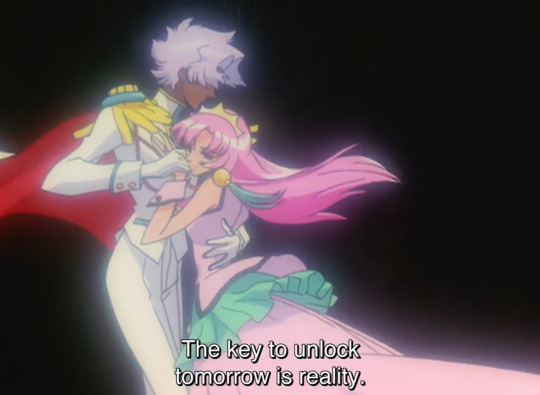
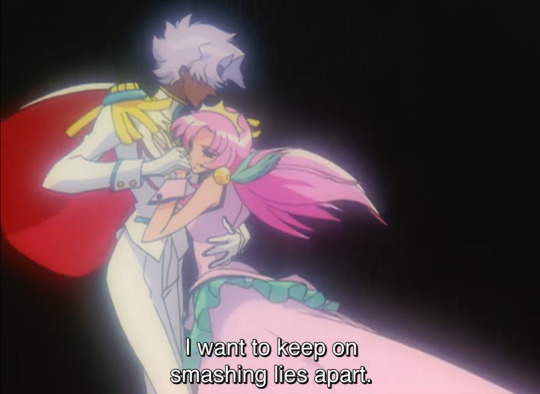
I hope this essay helped provide more context for the series. thanks for reading!
662 notes
·
View notes
Text
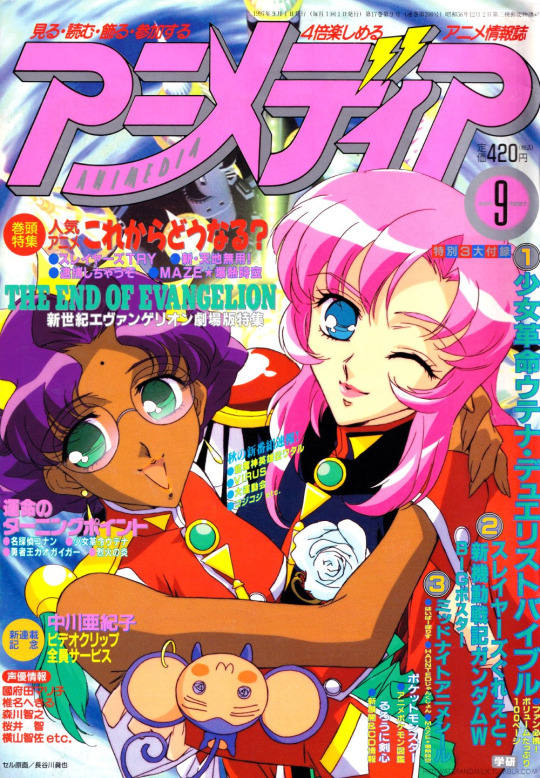
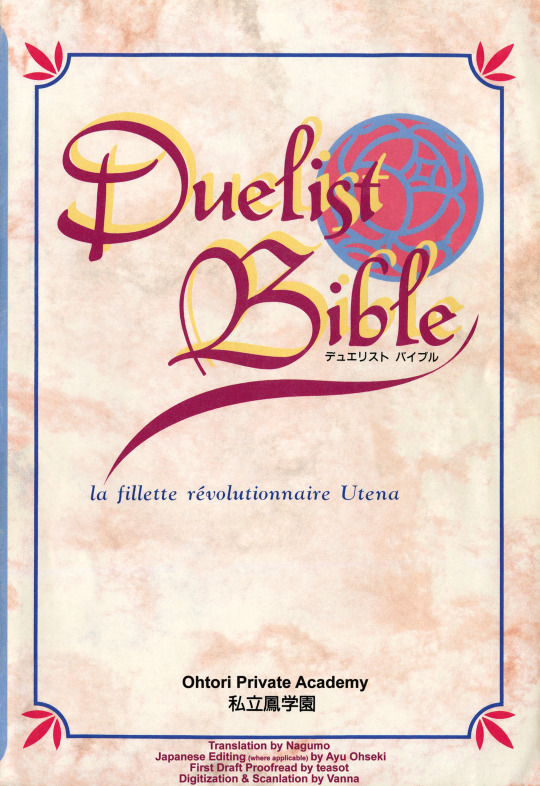
GOGAI, GOGAI!!! COME GET UTENA KIBBLES
It's September 3rd. It's 1997. Princess Diana just died, and that's very important to lots of people. You, however, are chewing your nails to nubs waiting for the climax of Revolutionary Girl Utena's Black Rose Saga. It's going to air today.
But like any good fan, you're already one step ahead, because you've spent the last couple days thumbing through Animedia's September issue supplemental, the 100 page Duelist Bible. Strangely, it appears to be in English??? Wow! Thanks Nagumo for translating, Ayu Ohseki for Japanese editing, teasot for proofreading, and ME, FUCKIN' VANNA, for scanning and scanlating this massive booklet!
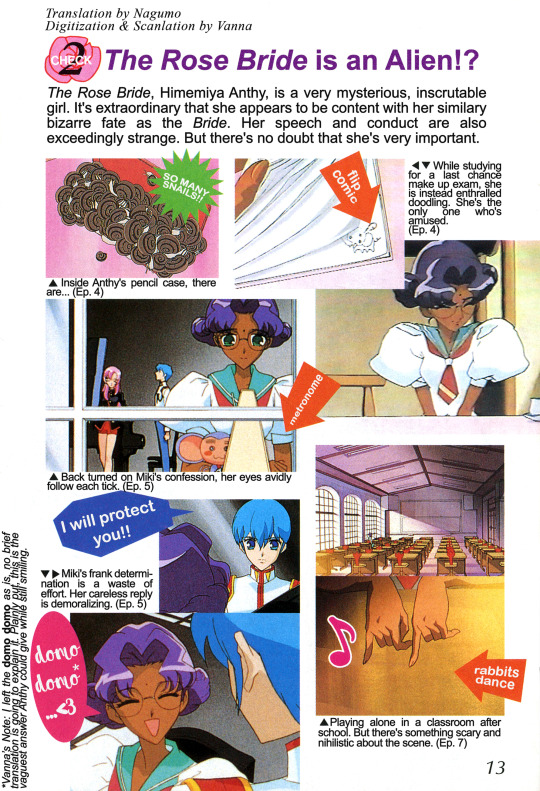
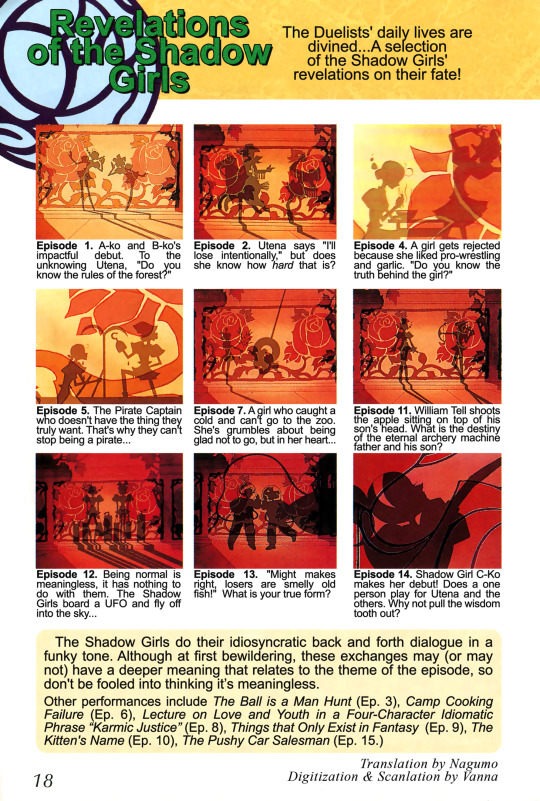
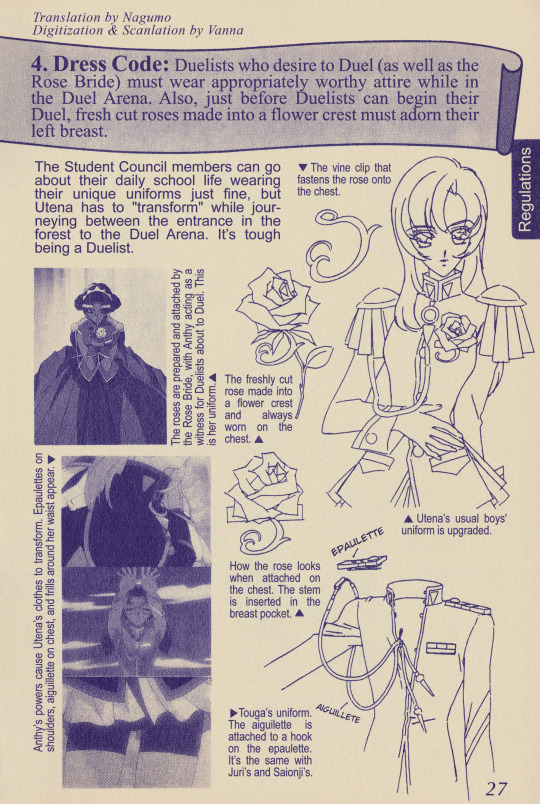
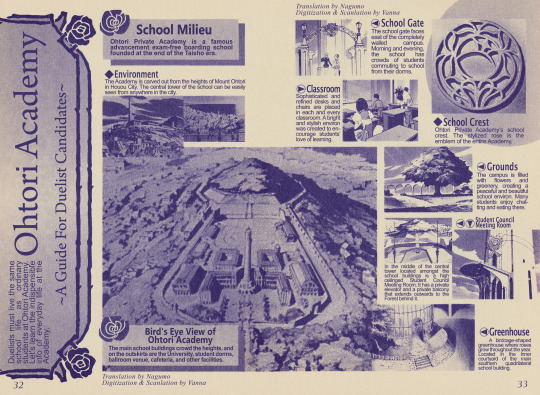
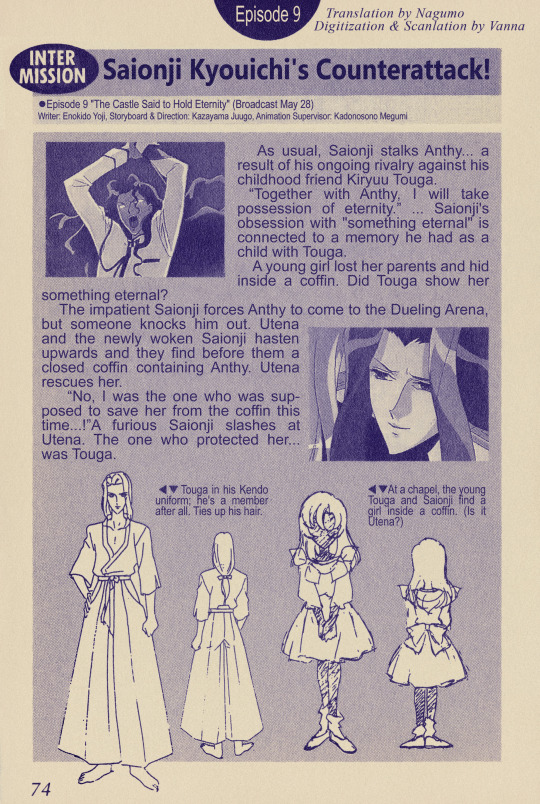
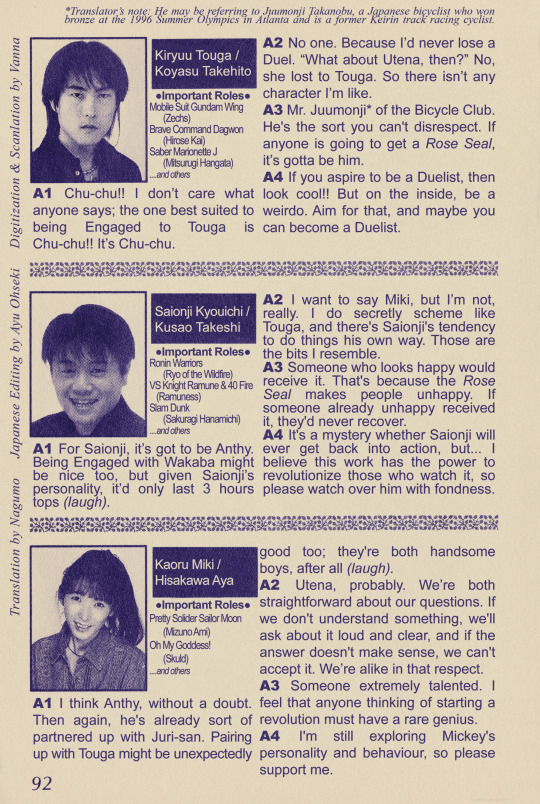
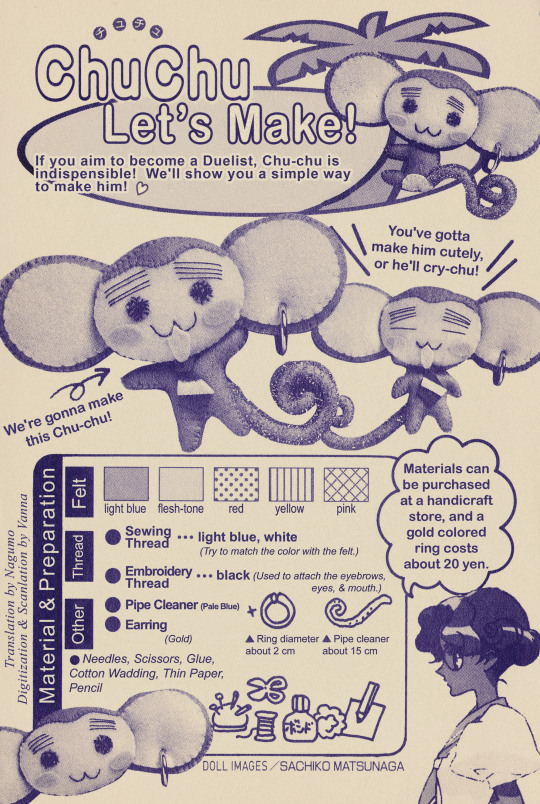
We've got duel summaries! We've got character design sheets! We've got a school directory! We've got THE DUEL RULES. We've got cast interviews! WE'VE GOT THAT CHU-CHU DOLL CRAFT GUIDE. Check it ALL out here, in the Something Eternal Bibliothèque! You can flip through it page by page here, or you'll also find on the page a link to a PDF version for your at home viewing/archiving needs!!
This gargantuan tome really gets it across that in 1997, you didn't have a fandom wiki or on demand viewing. If you didn't catch and record the episodes, a booklet like this becomes a critical tool for keeping track of everything that's happened up to now, and is also a way for the series creators to tap fans on the shoulder and draw attention to details they want seen but not explained in the show directly. For example, this drops at the close of the BRS, but points out Touga's sword isn't the same in Keiko's duel and in the opening sequence. A thing we don't see cashed in until MUCH later!
This has been a true and absurd labor of love on my part. I even rescanned the booklet from my originals because their quality (decades old lmao) was not worth scanlating. This took a ludicrous amount of time, and has been a main project of mine for over a year now!! I'm so happy to have gotten it done in time for the Something Eternal Watch-Along thread, and I really really hope everyone finds something cool and interesting about it! The really cool thing is this now completes the set of magazine supplementals by the big three magazines made for Utena during its run. We now have fully scanlated this, as well as Animage's June Utena Dossier, and Newtype's November Utena? (Oh My!) UTENA! Take a stroll through memory lane, be they yours or someone else's!
As always, if you like this kind of content, consider supporting us on Patreon! Especially right now, a holy grail acquisition is in the works that I will bleed to share with y'all. More on that later, lmao.
Revolutionize the World!
Love, Vanna
457 notes
·
View notes
Text
actually, the slice of life episodes are the most important. they only have those silly little duels to provide context for Nanami's Egg.
1K notes
·
View notes
Text



Now that I have given this as a surprise gift I can post it! Very excited with how this embroidery project turned out.
3K notes
·
View notes
Text

Wakaba Shinohara, Nanami Kiryuu, Juri Arisugawa - Utena, la fillette révolutionnaire
There it is, a triptych of my favorite duels from each season, and coincidentally my favorite characters.

#revolutionary girl utena#shoujo kakumei utena#fanart#shinohara wakaba#kiryuu nanami#arisugawa juri#god I love this triptych so much
6K notes
·
View notes
Text

Always wanted to draw these two.🌹 Then I found a brilliant Twelfth Night reference and thought nothing could suit them better.

2K notes
·
View notes
Text

Juri Arisugawa - Utena, la fillette révolutionnaire
6K notes
·
View notes
Text

Nanami Kiryuu - Utena la fillette révolutionnaire
5K notes
·
View notes
Text



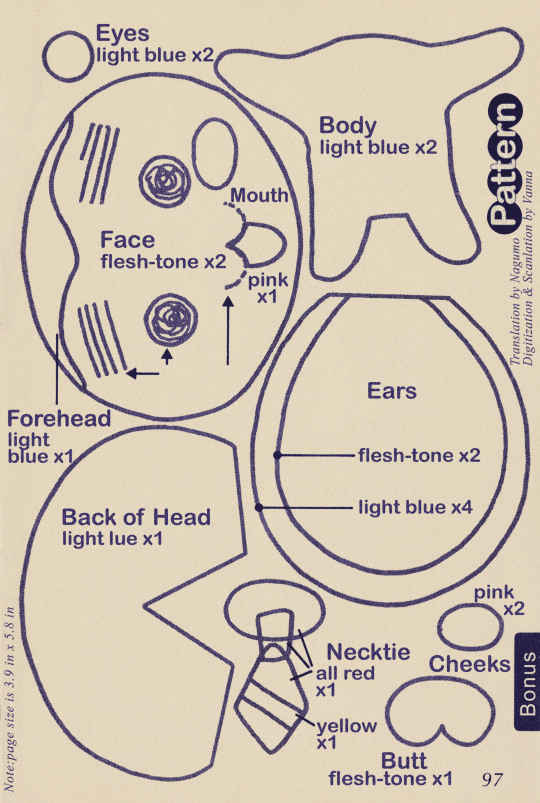

Hi, Vanna here. I have submitted to the strange authority of Xenforo's image hosting system, which demands that if I want gallery items to appear in proper order, I will have to upload them back to front.
As such, welcome to the last few page's of Animedia Magazine's September 1997 supplemental Duelist Bible, translated by Nagumo and edited by me!
Anyway
THIS IS NOT A DRILL, VINTAGE OFFICIAL PATTERNS FOR YOUR VERY OWN DIY CHU-CHU
6K notes
·
View notes
Text

lay my curses out to rest—
2K notes
·
View notes
Text
The heavy surrealism in RGU used to frustrate me as a new viewer, but now, I think it's such an integral piece of Ikuhara's storytelling. Because to me, the absurdities of Ohtori Academy perfectly capture how it feels to live under an abuser.
We as outside observers naturally question why there's a baseball game happening during the Student Council meeting, or how thirty cars can magically spring up in the middle of the dueling arena. And yet, the characters hardly bat an eye. Utena initially struggles to make sense of the duelists, the Rose Bride, and the Castle Said to Hold Eternity, but the more she becomes absorbed in this system, the more normalized it becomes.
We viewers fall for this, too! Show someone almost any Utena scene out of context, and they're going to have questions. Did that guy drive his car through a second-story window? Why is this boy boxing with a kangaroo?? Where the hell did all those swords come from???
"Yeah, don't think too hard about the logic. That's just how things are at Ohtori, you know?"
It's debatable to what extent the characters can perceive the visual symbolism that Ikuhara presents to us. Nevertheless, Ohtori remains a very weird place. But abusers possess the sinister power of normalizing behavior that any outsider would find absurd and unacceptable. They can — quite literally, in Akio's case — project their own version of reality onto their victims.
When Anthy gives Akio her glasses at the end of episode 39, she's rejecting the version of reality that he's convinced her to believe. Through Utena's sacrifice, she can finally see her circumstances for what they truly are.
The exit to Ohtori was always there for Anthy, but like so many real life victims of abuse, sometimes the logistics of leaving aren't what's keeping you trapped. An abuser can make themselves your whole world, and sometimes the greatest challenge can be realizing just how small, confining, and batshit crazy their rules really are.
Abandoning the life an abuser has made for you can feel impossible from the inside. But then you catch a glimpse of something beyond, something that makes you look around and ask, "How did I think any of this was even remotely normal?" And suddenly, leaving starts to feel like the most natural thing in the world.
2K notes
·
View notes
Text






From Mabel Episode 46: The Letters (Part Two)
155 notes
·
View notes
Text
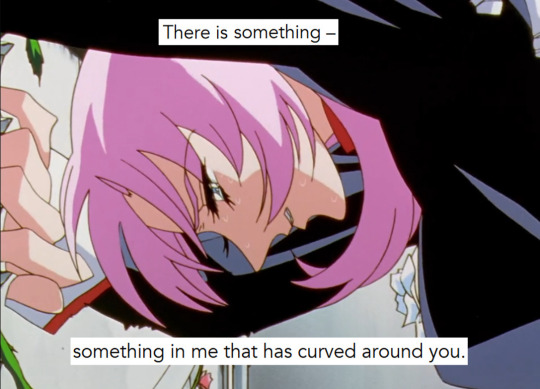

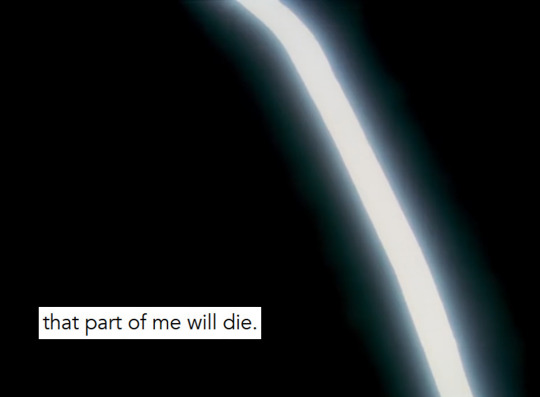
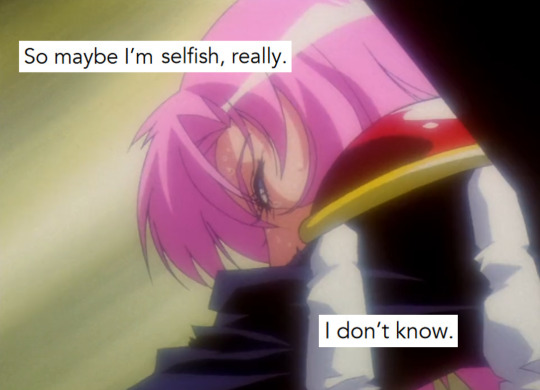
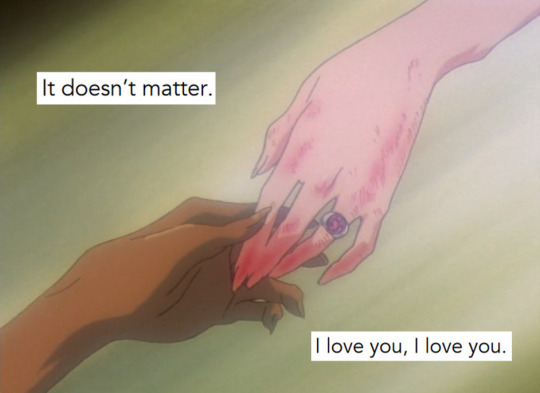
From Mabel Episode 16: Underworld
483 notes
·
View notes
Text
Link should be fixed now!
Hello folks! I’ve put together a package for the Utena Sega Saturn game for ease of access for anyone wanting to play!

Contains: -ISOs for both disks
- translation files
-instructions
-emulator
-virtual disc drive
You can find it here
Please let me know if there’s any issues with the files or link!
(Image source in content source below, from Empty Movement, game source was found on the old Empty Movement Forums and compiled and uploaded by me.)
EDIT 29/01/2024: Link should be fixed again, I know someone had an alternative somewhere in the notes if you wanna do that route, and thank you again to those that let me know recently that the link had gone down. As always, if there are issues let me know and I'll do my best to resolve them.
2K notes
·
View notes
Note
Apparently it was flagged for potential malware? Presumably because it has program files in it? It’s under review but I’ll keep a close eye on it!
hi! thanks so much for uploading the rgu game :) unfortunately drive is telling me it's been taken down for violating the terms of service, i'm not sure if this is a local issue (i'm in the EU) or if this has happened for everyone. would you be able to reupload, or is it being taken down immediately?
Oh I wasn’t aware of this at all! I’ll give it a look and see what’s up, and if necessary get it back up!
8 notes
·
View notes
Note
hi! thanks so much for uploading the rgu game :) unfortunately drive is telling me it's been taken down for violating the terms of service, i'm not sure if this is a local issue (i'm in the EU) or if this has happened for everyone. would you be able to reupload, or is it being taken down immediately?
Oh I wasn’t aware of this at all! I’ll give it a look and see what’s up, and if necessary get it back up!
8 notes
·
View notes
Text
As we make our resolutions and head into the new year, just remember that
If it cannot break out of its shell, the chick will die without being born. We are the chick, the world is our egg. If we don’t crack the world’s shell, we will die without being born. Smash the world’s shell, for the revolution of the world!
297 notes
·
View notes